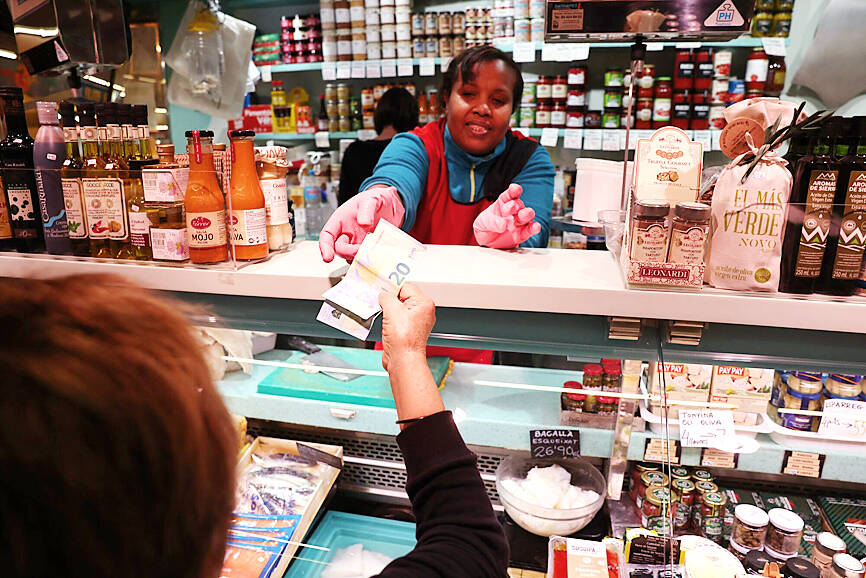The euro on Friday fell after economic data painted a mixed picture for growth and inflation across the eurozone, raising uncertainty around the size of the European Central Bank’s (ECB) expected interest rate hike next week.
Preliminary data showed that GDP in the eurozone expanded by 0.1 percent in the first quarter, below expectations in a Reuters poll for 0.2 percent.
The eurozone’s two largest economies, Germany and France, stagnated or barely grew, while the Spanish and Italian economies expanded more than expected.

Photo: Bloomberg
A flood of inflation data releases were also mixed.
“The euro is under pressure today as core inflation data out of France and Spain didn’t reach the burden of proof required to force the ECB into a 50bp [basis point] hike next week,” Monex Europe foreign exchange analysis head Simon Harvey said.
The euro fell 0.11 percent to US$1.1019, but remained near its recent one-year high, buoyed by expectations that the ECB still has further to go in raising interest rates, analysts said.
After the economic data, traders increased their bets that the ECB would hike by 25 basis points, rather than 50, next week, Refinitiv data showed.
The IMF on Friday called on the ECB to keep raising interest rates until the middle of next year to help bring down high inflation.
Versus the yen, the euro briefly rose to its highest level since December 2014 at ¥149.50. It closed up 1.61 percent at ¥150.2 after the Bank of Japan (BOJ) left its ultra-easy monetary policy unchanged even as it scrapped a pledge to keep interest rates low.
At Governor Kazuo Ueda’s first policy meeting, the bank said it would maintain ultra-low interest rates as expected, and unanimously decided to make no changes to its yield curve control policy.
However, the central bank removed a pledge to keep interest rates at “current or lower levels” and said it would “conduct a broad-perspective review of monetary policy.”
The yen fell sharply, also against the US dollar, down 1.72 percent to ¥136.31, its lowest since March 10.
“The hopes of a policy change have been somewhat dampened by the review,” Bank of Singapore currency strategist Moh Siong Sim said, adding that the likely length of the review might have cooled hopes for an imminent move in policy settings.
“For now, the outcome is read as dovish,” he said.
The New Taiwan dollar fell NT$0.030 against the US dollar to close at NT$30.740, down 0.38 percent from a week earlier.
Additional reporting by staff writer, with CNA

Semiconductor business between Taiwan and the US is a “win-win” model for both sides given the high level of complementarity, the government said yesterday responding to tariff threats from US President Donald Trump. Home to the world’s largest contract chipmaker, Taiwan Semiconductor Manufacturing Co (TSMC, 台積電), Taiwan is a key link in the global technology supply chain for companies such as Apple Inc and Nvidia Corp. Trump said on Monday he plans to impose tariffs on imported chips, pharmaceuticals and steel in an effort to get the producers to make them in the US. “Taiwan and the US semiconductor and other technology industries

SMALL AND EFFICIENT: The Chinese AI app’s initial success has spurred worries in the US that its tech giants’ massive AI spending needs re-evaluation, a market strategist said Chinese artificial intelligence (AI) start-up DeepSeek’s (深度求索) eponymous AI assistant rocketed to the top of Apple Inc’s iPhone download charts, stirring doubts in Silicon Valley about the strength of the US’ technological dominance. The app’s underlying AI model is widely seen as competitive with OpenAI and Meta Platforms Inc’s latest. Its claim that it cost much less to train and develop triggered share moves across Asia’s supply chain. Chinese tech firms linked to DeepSeek, such as Iflytek Co (科大訊飛), surged yesterday, while chipmaking tool makers like Advantest Corp slumped on the potential threat to demand for Nvidia Corp’s AI accelerators. US stock

The US Federal Reserve is expected to announce a pause in rate cuts on Wednesday, as policymakers look to continue tackling inflation under close and vocal scrutiny from US President Donald Trump. The Fed cut its key lending rate by a full percentage point in the final four months of last year and indicated it would move more cautiously going forward amid an uptick in inflation away from its long-term target of 2 percent. “I think they will do nothing, and I think they should do nothing,” Federal Reserve Bank of St Louis former president Jim Bullard said. “I think the

‘LASER-FOCUSED’: Trump pledged tariffs on specific sectors, including semiconductors, pharmaceuticals, steel, copper and aluminum, and perhaps even cars US President Donald Trump said he wants to enact across-the-board tariffs that are “much bigger” than 2.5 percent, the latest in a string of signals that he is preparing widespread levies to reshape US supply chains. “I have it in my mind what it’s going to be but I won’t be setting it yet, but it’ll be enough to protect our country,” Trump told reporters on Monday night. Asked about a report that incoming US Secretary of the Treasury Scott Bessent favored starting with a global rate of 2.5 percent, Trump said he did not think Bessent supported that and would not